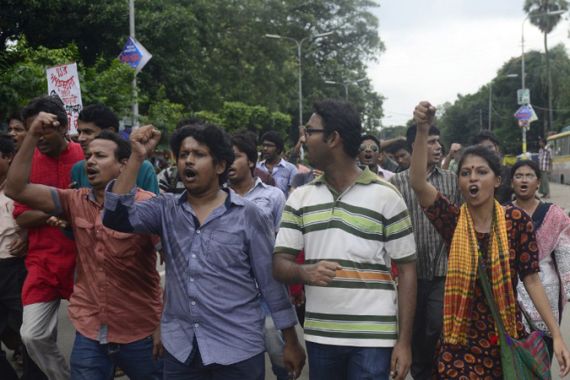Four Bangladeshis die in latest Azam unrest
Girl, nine, among victims, as police kill two protesters at rally for Ghulam Azam, spiritual leader of Jamaat-e-Islam.

Police have killed two people when they fired on demonstrators marching in southwest Bangladesh during a day-long nationwide strike in protest against the conviction of former Islamist party leader Ghulam Azam for war crimes.
Al Jazeera’s Tanvir Chowdhury, reporting from Dhaka, said that the protesters were among four people to die, including a nine-year-old girl, in the latest violence to hit Bangladesh over the war crimes tribunal verdict
District deputy police chief Tajul Islam said on Tuesday that thousands of protesters from Bangladesh’s largest Islamic party, Jamaat-e-Islami, rampaged with sticks and machetes, as well as throwing homemade, bombs in Satkhira district.
Islam said Jamaat supporters attacked a police officer as officers tried to clear a main road blocked by fallen trees in the town of Kaliganj, as part of protests over the conviction of Azam Jamaat’s spiritual leader, by a court on Monday.
“They hacked him with a machete,” Islam said of the attack on the police officer. “We opened fire at them to rescue the officer. Two Jamaat activists were hit by bullets and they died.”
He said that several people were injured in the melee.
A Bangladesh war crimes tribunal found Azam guilty of masterminding atrocities during the 1971 war of independence against Pakistan.
The 90-year-old was found guilty by the International Crimes Tribunal on five charges including murder and torture.
Nationwide strike
Jamaat, a key member of the opposition, called a nationwide strike to protest against the verdict, saying the war crimes trials were aimed at eliminating its leaders.
Chowdhury said that two people, including a nine-year-old girl, were killed in separate incidents of picketing in the industrial town of Gazipur, on the outskirts of Dhaka, and Dinajpur in northern Bangladesh on Tuesday.
At least three people died on Monday in clashes after the verdict was announced. Azam supporters said the trial was politically motivated, while opponents are furious that he was not sentenced to death.
Three tribunal judges announced their verdict in a packed courtroom in the Dhaka. They said that he deserved the death sentence, but a jail term was preferred due to his advanced age and health complications.
Azam’s lawyer Toby Cadman said in a written statement that the defence team would immediately start in its preparation to mount an appeal.
Deadly street violence erupted across Bangladesh before and after the judgement, handed down by the International Crimes Tribunal.
In Dhaka, Azam supporters used homemade bombs in clashes wirh police, who fired baton rounds.
Local media said that at least three Jamaat-e-Islami activists were killed in Bangladesh on Monday.
Two were beaten to death by opposition activists in southwestern Kushtia district as they tried to block a road. One was killed in northwestern Chapainawabganj district when paramilitary border guards opened fire after a bomb was thrown at police.
Police also fired baton rounds at protesters in the cities of Bogra, Comilla and Rajshahi after activists went on the rampage, attacking and burning dozens of vehicles, police officials told AFP.
|
|
| Azam’s lawyer lashes out on Al Jazeera against war crimes verdict |
Prosecutors had sought the death penalty for Azam, describing him as a “lighthouse” who guided all war criminals, and the “architect” of the militias which committed many of the 1971 atrocities.
When India intervened at the end of the nine-month war and it became clear Pakistan was losing, the militias killed dozens of professors, playwrights, filmmakers, doctors and journalists.
Azam was described as the “mastermind” of the massacres of the intellectuals. Many of their bodies were found a few days after the war at a marsh outside the capital, blindfolded and with their hands tied behind their backs.
Azam is the fifth person convicted by the International Crimes Tribunal. Three people have been sentenced to death for their role and one was given life imprisonment.
Previous verdicts by the tribunal have sparked widespread and deadly violence on the streets of Bangladesh.